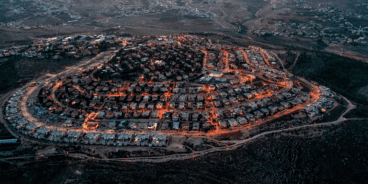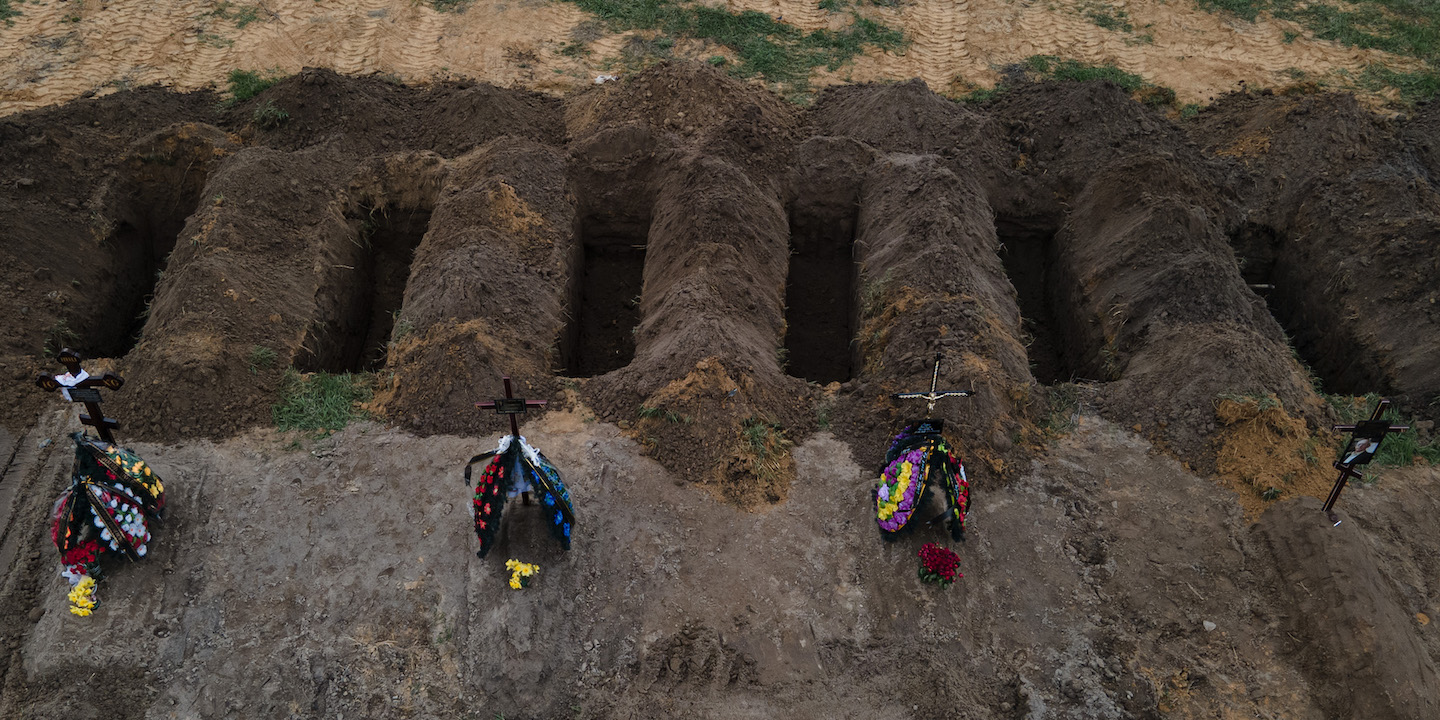

Atrocity Alert No. 297: Ukraine, Israel and the Occupied Palestinian Territory and Myanmar (Burma)
Atrocity Alert is a weekly publication by the Global Centre for the Responsibility to Protect highlighting situations where populations are at risk of, or are enduring, mass atrocity crimes.
HUNDREDS OF CIVILIANS FOUND EXECUTED AROUND KYIV, UKRAINE
Following the retreat of Russian forces from the suburbs of Kyiv, Ukraine, at the end of March, reports emerged of hundreds of civilian casualties in previously Russian-occupied areas. While early reports focused on evidence of targeted killings in the city of Bucha, on Friday, 15 April, Kyiv’s regional police force reported that the bodies of more than 900 civilians have been discovered in the region. According to the police, nearly 95 percent of the people had been fatally shot, with many bodies abandoned in the streets or given temporary burials. Andriy Nebytov, head of the regional police force, said that, “consequently, we understand that under the (Russian) occupation, people were simply executed in the streets” and alleged that Russian troops had “tracked down” people who expressed strong pro-Ukrainian views.
Since 15 April Russian forces have carried out hundreds of missile strikes in Ukraine, targeting locations in cities throughout the country, including Kharkiv in the east, the port city of Mykolaiv in the south, and Lviv along the western border with Poland. While many of the missile strikes hit military targets, Russian forces have also continued their assault on critical civilian infrastructure, including health care facilities. Lviv currently hosts tens of thousands of civilians who previously fled fighting in eastern Ukraine. The missile strikes come as Russian forces launched an anticipated ground offensive in the Donbas region, which Russian Foreign Minister Sergey Lavrov remarked would be a “new phase” in his government’s so-called special operation in Ukraine.
Meanwhile, Russian forces continue their 7-week siege of the port city of Mariupol, where thousands of civilians remain trapped without access to food, water, heat or electricity. As Russian forces attempt to take control of the city, the defense ministry has issued several surrender-or-die ultimatums for hundreds of Ukrainian troops and civilians hiding in the city’s Azovstal steel plant.
On Tuesday, 19 April, UN Secretary-General António Guterres warned that amidst “the intense concentration of forces and firepower… The onslaught and terrible toll on civilians we have seen so far could pale in comparison to the horror that lies ahead,” and called for a “4-day Holy Week humanitarian pause,” coinciding with Orthodox Easter. The Secretary-General noted that a humanitarian pause could provide the necessary conditions to allow for the safe passage of all civilians willing to leave areas of current and expected confrontation, as well as for the safe delivery of humanitarian aid to people in the hardest-hit areas.
HUNDREDS DETAINED AND INJURED DURING RAIDS BY ISRAELI FORCES IN EAST JERUSALEM
Over 150 Palestinians were injured and at least 300 detained during two large-scale raids by Israeli police on 15 and 17 April at the al-Aqsa Mosque compound in East Jerusalem in the Occupied Palestinian Territory (OPT). Israeli police used disproportionate force, tear gas, stun grenades and rubber bullets to forcefully remove Palestinians from the compound. UN Secretary-General António Guterres expressed deep concern for the deteriorating situation in East Jerusalem and called “for the status quo at the holy sites in Jerusalem to be upheld and respected.”
The recent violent incidents at the al-Aqsa Mosque compound were reminiscent of similar raids carried out by Israeli forces during the Muslim holy month of Ramadan in May 2021. Following weeks of escalating tensions and protests, over 1,000 Palestinians were injured in a series of raids from 7-10 May. The violence rapidly escalated and from 10-21 May Hamas indiscriminately fired rockets into Israel while Israel engaged in retaliatory airstrikes on Gaza. Israeli airstrikes killed and injured an estimated 2,170 Palestinians while indiscriminate rockets by Hamas and other Palestinian armed groups killed at least 12 Israelis.
Ahead of last week’s raids at al-Aqsa, targeted attacks had been escalating over the past month. Since 22 March five Palestinian assailants perpetrated four attacks in Israeli cities, killing 14 people. The violence prompted Israeli Prime Minister Naftali Bennett to grant “all security forces full freedom” of operations in an attempt to prevent further attacks. Israeli forces then launched widespread raids across the occupied West Bank, killing more than 25 Palestinians.
The recent violence is occurring amidst systematic human rights violations in the OPT, including war crimes and crimes against humanity. On 9 April Israel implemented a set of sweeping economic sanctions against residents of Jenin city that potentially amount to collective punishment. Last month the UN Special Rapporteur for the situation of human rights in the Palestinian territories occupied since 1967 concluded that Israel’s two-tier legal and political system amounts to the international crime of apartheid. Under the International Convention Against Apartheid and the Rome Statute of the International Criminal Court, apartheid is a crime against humanity.
The international community should immediately condemn the violence at al-Aqsa Mosque and call upon Israeli forces to refrain from using disproportionate force. The international community should urgently ensure accountability for ongoing atrocity crimes perpetrated in Israel and the OPT, including the crime of apartheid. UN members states should implement a series of measures in line with international legal principles to bring Israel’s 55-year occupation and apartheid practices to an end.
MYANMAR’S HEALTH SYSTEM IN COLLAPSE AS THE MILITARY TARGETS MEDICAL WORKERS
Myanmar’s (Burma) military – the Tatmadaw – is intensifying its crackdown on the country’s healthcare system as part of its broader campaign to repress ongoing anti-coup resistance throughout the country. Since the coup, military forces have arrested doctors, revoked the licenses of prominent physicians, searched hospitals for wounded resistance fighters and threatened to close health care facilities that employ anti-junta doctors. According to Physicians for Human Rights, Myanmar is the one of the most dangerous places in the world to be a health worker, with more documented attacks against healthcare in 2021 than any other country.
The military has consistently targeted Myanmar’s doctors since the February 2021 coup, with attacks against health care workers increasing from September – January 2022 amid escalating violence across the country. Physicians for Human Rights estimated in January that the military had killed at least 30 doctors, arbitrarily arrested or detained over 286 health workers and attacked 128 health facilities since the coup. The military has also occupied dozens of hospitals and used them as military bases, in violation of International Humanitarian Law, discouraging patients from seeking medical help. The Tatmadaw’s intentional targeting of hospitals may amount to war crimes.
The collapse of Myanmar’s healthcare system is having devastating consequences for civilians. Access to healthcare is severely limited amidst a significant shortage of doctors, lack of essential resources and closure of many medical facilities. Anti-junta doctors estimate that hundreds of people die every week as a result of the collapsed healthcare system while the UN Children’s Fund has reported that almost one million children are not receiving routine immunizations. The situation is especially dire for regions facing heightened violent conflict, where government-run hospitals often do not operate. Some doctors who refuse to work at military hospitals offer free services at private and underground clinics; however, the military is also targeting those facilities and has deemed the people who are seeking care from these clinics as “illegal patients.”
The deliberate targeting of health care workers and facilities underscores the severity of the military’s broader campaign to quash resistance. Liam Scott, Research Associate at the Global Centre for the Responsibility to Protect, said that, “as the Tatmadaw continues to harass and target anti-regime doctors, the human rights and health catastrophes will grow increasingly grave. The dire situation demonstrates the urgent need for increased international action.” The UN Security Council should immediately impose an arms embargo on Myanmar and sanction the country’s oil and gas sector. UN member states must provide support to humanitarian organizations seeking to address the healthcare crisis in Myanmar.
Related Content


Atrocity Alert No. 403: Israel and the Occupied Palestinian Territory, Sudan and the UN Human Rights Council
